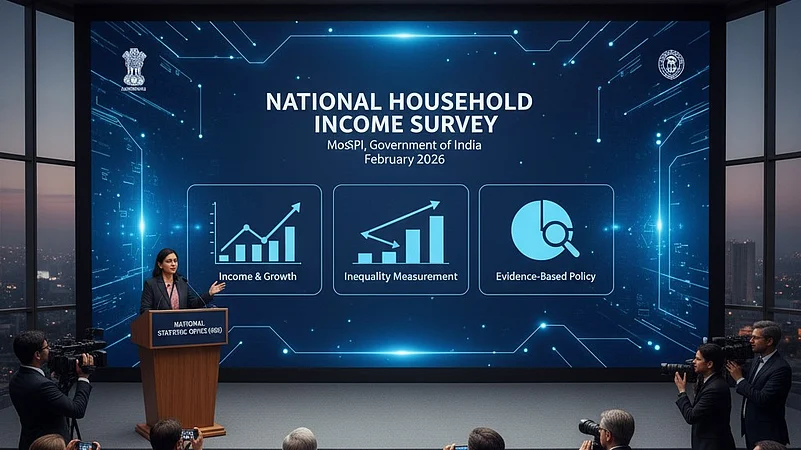
The Ministry of Statistics and Programme Implementation will conduct the first-ever National Household Income Survey (NHIS) in February 2026 to directly measure household income across the country.
MoSPI is seeking suggestions from experts, researchers, and citizens to improve the survey’s questionnaire.
The NHIS will fill a critical gap in India’s data system, allowing for accurate income distribution analysis.
Deadline for Feedback: October 30, 2025
The government will hold a pan-Indian National Household Income Survey (NHIS) in February 2026, the Ministry of Statistics and Programme Implementation (MoSPI) announced on Monday. The National Statistics Office (NSO) under the ministry will be conducting the survey and will cover various social and economic subjects.
The household income survey will be a crucial initiative by the Ministry to assess income distribution and address key welfare programmes. The Ministry earlier this year has called for an “urgent need” for a dedicated income survey to understand and analyse the structural shifts in Indian economy that have occurred over the past 75 years.
The government has sought feedback from policy experts, researchers, and the general public to ensure the survey is comprehensive, accurate, and reflective of India's diverse income patterns. As this is the first-ever pan-India household income survey, public input is considered crucial to strengthen its methodology and relevance.
Feedback is especially invited on topics such as “household income, wages and salaries, self-employment earnings, property income, remittances, or any other relevant component of household income,” according to the ministry.
“These inputs will help enhance the quality, coverage, and policy relevance of the forthcoming National Household Income Survey, 2026,” a statement from the ministry said.
What is the National Household Survey?
Since 1950, the Government of India has conducted National Household Survey (NHS) as part of its effort to collect vital socio-economic data. The national household survey has served as a vital source for data-based policymaking by capturing household welfare, consumption, employment, health, assets, indebtedness and other socio-economic patterns. The data derived from the NHS are used for rebasing consumer price index and are crucial for analysing living conditions, poverty and hardship in communities.
What is new in National Household Survey 2026 and Why Is The Govt Doing It?
One of the major initiatives in the 2026 NHS is the introduction of the National Household Income Survey (NHIS), which will mark the first ever pan-Indian survey which is focused on measuring household income. The government took the initiative primarily to address and assess the challenges in India’s income inequality and aims to bridge the gap in India’s socio-economic statistics system.
NHIS is expected to provide detailed information on people’s living conditions and income/expenditure patterns. The household income survey also allows for inter-personal comparison of incomes and analysis of sources and patterns of income generation, unlike data derived from National Accounts Statistics (NAS). The NHIS strives to generate estimates of total household income at a pan-Indian level.
Flagship welfare schemes such as PM-KISAN, Ujjwala, and Ayushman Bharat rely heavily on accurate targeting of beneficiaries. However, gaps and inconsistencies in existing data systems have limited their efficiency, making it difficult to clearly identify who needs support and increasing the risk of leakage.
Post-pandemic shifts in policy and economy have also led to increased exposure to vulnerabilities, which has not been able to address due to discrepancy in data collection. Moreover, the MoSPI highlighted that the NHIS has been a global practice, in both developed and developing countries, which pushes India to now adopt to international practices to track quality of living, poverty, income inequality and social mobility .
“In many countries, including developed countries like Canada, United States of America and United Kingdom and less developed countries like Sri Lanka, Bangladesh, China and Malaysia, household income data is collected through household surveys,” the MoSPI said in a statement.
Who is Heading the Survey?
The Ministry of Statistics and Programme Implementation has constituted a Technical Expert Group, chaired by Dr. Surjit S. Bhalla, Former Executive Director of India, International Monetary Fund. As per the recommendation of the Group, a pre-testing exercise of the draft schedule for NHIS 2026 was conducted from 4th-8th of August to evaluate clarity, comprehension, interpretability, and acceptability of the questionnaire. The exercise was carried out across major cities including Mumbai, Delhi, Kolkata, Chennai, Bangalore, and Hyderabad.
“Pre-testing of data collection instruments is a standard practice in large-scale socio-economic surveys to identify issues related to clarity, flow, structure, and respondent burden before final field deployment. The exercise helped NSO to refine the NHIS questionnaire and ensure that the final instrument is robust, reliable, and user-friendly,” the press release said.
Govt Invites Public Feedback
The NHIS 2026 has been prepared incorporating the recommendations of the pre-testing exercise. The ministry has also invited researchers, policymakers, institutions and general public to provide their suggestions and comments on the draft schedule. The last date for submission of the suggestions is October 30th.





























